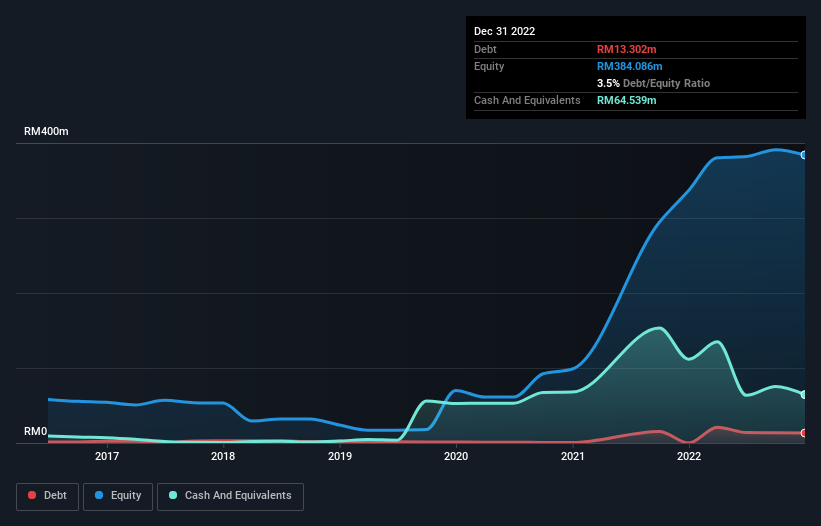- Malaysia
- /
- Healthcare Services
- /
- KLSE:HONGSENG
Is Hong Seng Consolidated Berhad (KLSE:HONGSENG) A Risky Investment?
Some say volatility, rather than debt, is the best way to think about risk as an investor, but Warren Buffett famously said that 'Volatility is far from synonymous with risk.' So it seems the smart money knows that debt - which is usually involved in bankruptcies - is a very important factor, when you assess how risky a company is. Importantly, Hong Seng Consolidated Berhad (KLSE:HONGSENG) does carry debt. But should shareholders be worried about its use of debt?
Why Does Debt Bring Risk?
Generally speaking, debt only becomes a real problem when a company can't easily pay it off, either by raising capital or with its own cash flow. Part and parcel of capitalism is the process of 'creative destruction' where failed businesses are mercilessly liquidated by their bankers. While that is not too common, we often do see indebted companies permanently diluting shareholders because lenders force them to raise capital at a distressed price. Of course, the upside of debt is that it often represents cheap capital, especially when it replaces dilution in a company with the ability to reinvest at high rates of return. When we think about a company's use of debt, we first look at cash and debt together.
View our latest analysis for Hong Seng Consolidated Berhad
How Much Debt Does Hong Seng Consolidated Berhad Carry?
The image below, which you can click on for greater detail, shows that at December 2022 Hong Seng Consolidated Berhad had debt of RM13.3m, up from none in one year. But it also has RM64.5m in cash to offset that, meaning it has RM51.2m net cash.

How Strong Is Hong Seng Consolidated Berhad's Balance Sheet?
According to the last reported balance sheet, Hong Seng Consolidated Berhad had liabilities of RM21.9m due within 12 months, and liabilities of RM13.5m due beyond 12 months. Offsetting this, it had RM64.5m in cash and RM177.1m in receivables that were due within 12 months. So it actually has RM206.3m more liquid assets than total liabilities.
This surplus strongly suggests that Hong Seng Consolidated Berhad has a rock-solid balance sheet (and the debt is of no concern whatsoever). Having regard to this fact, we think its balance sheet is as strong as an ox. Simply put, the fact that Hong Seng Consolidated Berhad has more cash than debt is arguably a good indication that it can manage its debt safely.
The modesty of its debt load may become crucial for Hong Seng Consolidated Berhad if management cannot prevent a repeat of the 78% cut to EBIT over the last year. When it comes to paying off debt, falling earnings are no more useful than sugary sodas are for your health. The balance sheet is clearly the area to focus on when you are analysing debt. But you can't view debt in total isolation; since Hong Seng Consolidated Berhad will need earnings to service that debt. So when considering debt, it's definitely worth looking at the earnings trend. Click here for an interactive snapshot.
Finally, a company can only pay off debt with cold hard cash, not accounting profits. Hong Seng Consolidated Berhad may have net cash on the balance sheet, but it is still interesting to look at how well the business converts its earnings before interest and tax (EBIT) to free cash flow, because that will influence both its need for, and its capacity to manage debt. During the last three years, Hong Seng Consolidated Berhad burned a lot of cash. While that may be a result of expenditure for growth, it does make the debt far more risky.
Summing Up
While it is always sensible to investigate a company's debt, in this case Hong Seng Consolidated Berhad has RM51.2m in net cash and a decent-looking balance sheet. So we don't have any problem with Hong Seng Consolidated Berhad's use of debt. When analysing debt levels, the balance sheet is the obvious place to start. But ultimately, every company can contain risks that exist outside of the balance sheet. For instance, we've identified 2 warning signs for Hong Seng Consolidated Berhad that you should be aware of.
Of course, if you're the type of investor who prefers buying stocks without the burden of debt, then don't hesitate to discover our exclusive list of net cash growth stocks, today.
Valuation is complex, but we're here to simplify it.
Discover if Hong Seng Consolidated Berhad might be undervalued or overvalued with our detailed analysis, featuring fair value estimates, potential risks, dividends, insider trades, and its financial condition.
Access Free AnalysisHave feedback on this article? Concerned about the content? Get in touch with us directly. Alternatively, email editorial-team (at) simplywallst.com.
This article by Simply Wall St is general in nature. We provide commentary based on historical data and analyst forecasts only using an unbiased methodology and our articles are not intended to be financial advice. It does not constitute a recommendation to buy or sell any stock, and does not take account of your objectives, or your financial situation. We aim to bring you long-term focused analysis driven by fundamental data. Note that our analysis may not factor in the latest price-sensitive company announcements or qualitative material. Simply Wall St has no position in any stocks mentioned.
About KLSE:HONGSENG
Hong Seng Consolidated Berhad
An investment holding company, engages in gloves and NBL manufacturing, healthcare, and financial services in Malaysia and Australia.
Good value with adequate balance sheet.
Market Insights
Community Narratives



